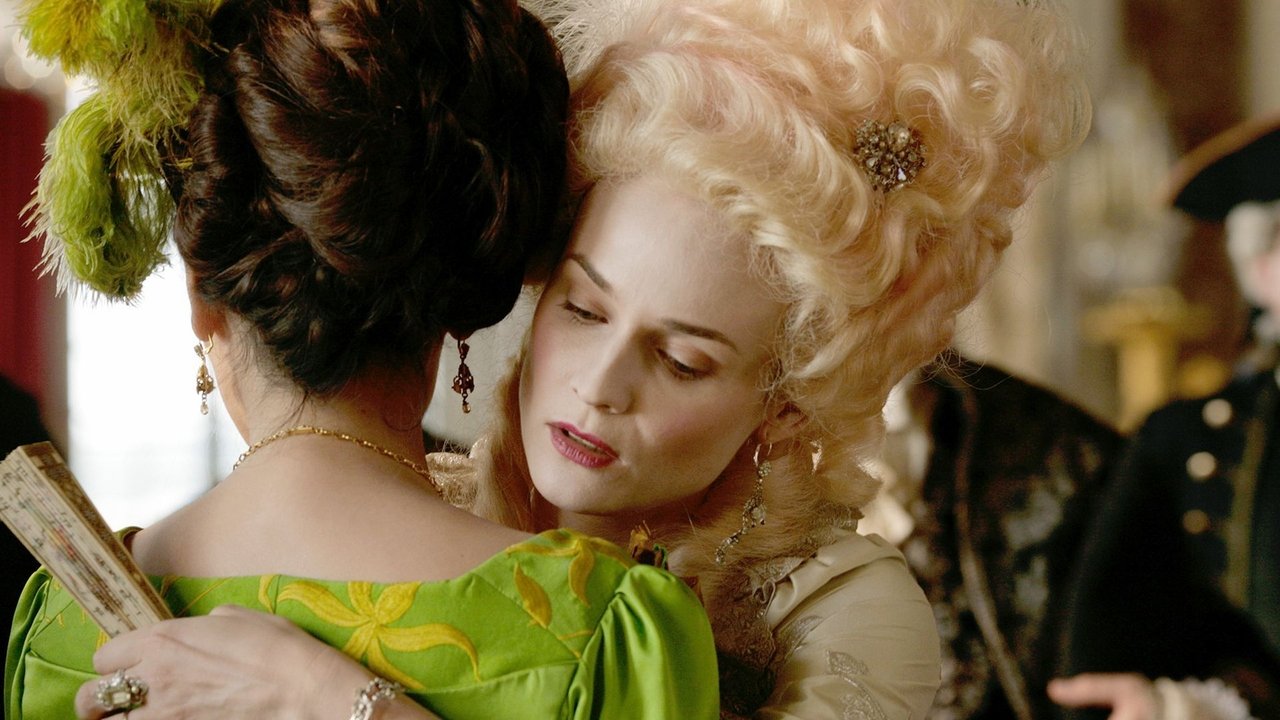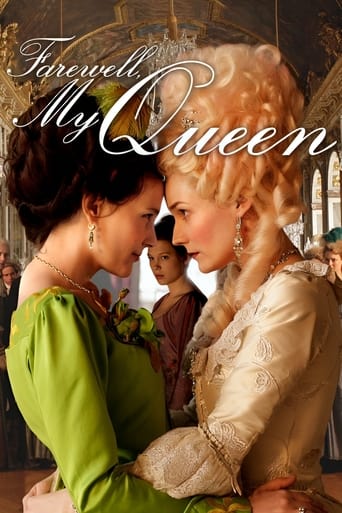Titreenp
SERIOUSLY. This is what the crap Hollywood still puts out?
Afouotos
Although it has its amusing moments, in eneral the plot does not convince.
Murphy Howard
I enjoyed watching this film and would recommend other to give it a try , (as I am) but this movie, although enjoyable to watch due to the better than average acting fails to add anything new to its storyline that is all too familiar to these types of movies.
Neive Bellamy
Excellent and certainly provocative... If nothing else, the film is a real conversation starter.
Irishchatter
In this movie, it's mostly based on during the French revolution year with Léa Seydoux as the Queen Marie Antoinette's reader. It's very odd in some ways, yet you would really like to know what's going on or better, what happens next. It really seemed to me that the Queen had a few women lovers. I wonder is this actually true or is it really the film giving it a storyline? Either way, I think it's well done to be honest. You wouldn't actually think this film would be boring to watch. Actually there's so much action going on that you wouldn't have time to think it's boring or not. That's what I really like about these films. I would wish all films can make you feel distracted more then trying to find the streaming button to skip the scenes. Gladly I didn't need to do it with this film, I'm happy that I did see the movie without any disappointments! Although it's not my favorite film but it is entertaining!
Heinz Mannberger
Despite having a great interest in the late 18th century, I have not found many films that strike my particular chords. 'Les adieux à la reine' is one of them, and it does so mainly for two reasons: first, because it nicely shows us the dark underbelly of the lavish gold-plated upper rooms of the French royal palace at Versailles, exposing the system that contradicted the later observation by that inveterate revolutionary Thomas Jefferson, who was the American minister to France from 1785 to 1789, that: 'the mass of mankind has not been born with saddles on their backs, nor a favored few booted and spurred, ready to ride them legitimately, by the grace of God.' Second, because it shows us that for all their faults, the royals and their noble entourage where people too. People who did not voluntarily run for office, who loved their children and friends as much as anyone else would, and whose fears of what might be done to their loved ones and themselves drove them to nightmares and tears. Even if it was true that 'Louis must die that the country may live', as that great butcherer of men, Maximilien Robespierre, later remarked, the violent character of the French Revolution must surely have done great damage to their proclaimed ideals as well.Some have criticized the two main actresses for appearing stiff and lacking spontaneity; and I can certainly see where that is coming from, but rather than seeing this as a negative, I think it works to illustrate the strict protocols and the ever present divides of class and status that permeate life at Versailles. With one notable exception, the personal opinions and whims of Sidonie Laborde (Léa Seydoux) are simply not tolerated by anyone other than her fellow servants. A seeming relaxed and smiling social better instantly turns on her the moment she does anything deemed unacceptable, and when she finally does 'win the love' of Queen Marie Antoinette (Diane Kruger) it is for reasons completely out of line with what Sidonie might have wished for, but should probably have come to expect.Because if there is one thing about the character of Sidonie that I would criticize, it is exactly that: for someone seemingly so inquisitive, so observant of social protocol, and yet so willing to force her will through at certain times, she appears completely unable to assert herself around Queen Marie Antoinette - even when the rats are leaving the sinking ship, to use a Dutch expression. But perhaps this is unfair: perhaps she really did feel unconditional love towards the Queen.Speaking of love, who can fault Queen Marie Antoinette for being completely swept off her feet by Yolande Martine Gabrielle de Polastron, 'la duchesse de Polignac' (Virginie Ledoyen). The movie seems to portray her as a somewhat more recent and distant presence at the court than she was in reality, but regardless, it gives the viewers a peak into the upper layers of society at Versailles. If the adage 'play or be played' is too modern a description, something more contemporary would surely have conveyed the same idea.All in all, I consider this to be a fine film indeed. Diane Kruger gives us one of the more believable portrayals of Queen Marie Antoinette in recent times. If nothing else, acknowledgement of the fact that she was a mother in her mid-30s, and not a frivolous 20 year old, is a good start. But the film goes further, probably in line with the recent trend among historians to view Queen Marie Antoinette in a more positive light.One final note about the supposed pornographic nature of some scenes, pointed out in the reviews of others (mostly Americans); there is nudity, a kiss, and some longing stares. But this is nothing out of the ordinary in French, and indeed most European, films. Don't miss out on this film for fear of seeing a naked torso!
SConIrish
In film alone there have been eight representations depicting the life and times of Marie Antoinette. Benoit Jacquot's latest interpretation comes from a screenplay that he and Gilles Taurant adapted from Chantal Thomas's novel. Filmed largely at Versailles it looks closely at the class divide between monarch and servant and how blind love can distort your view. It's told from the point of view of a servant blindly committed to her Queen. Visually sumptuous with a compelling narrative it skilfully avoids the dullness of many period dramas.The story takes place during the last four days leading up to the French Revolution. Culminating in the overthrow of the monarchy and the execution of the King and Queen of France. A young woman Sidonie (Lea Seydoux) is the official reader to the Queen. She is Marie Antoinette's (Diane Kruger) number one fan. Scratching away at mosquito bites and grimacing at the site of a giant rat lurking in the servant's quarters she chooses to ignore all the rumblings and gossip of rebellion and dissent emerging around her. She is an unapologetic servant of the beautiful seductive Queen. Having shared a coffee she observes "It's all going wonderfully well." Marie Antoinette spends most of her time draped in fine clothes and surrounded by gold in her private chambers. She vaguely peruses the latest fashion magazine. She requests embroidery and books, self-absorbed, vain and removed from the realities of poverty and deprivation outside her Palace walls. Running and stumbling and always late Sidonie serves at the behest of her Queen. "So young and already so blind" comments the wise old historian Morcau (Michael Robin). As the days pass the hallways and corridors become crowded with panicked servants and gentry alike. A list of names to be beheaded emerges causing terror amongst the Bourgeoisie. The final hours of a corrupt monarchy reveal a Queen who will sacrifice anyone for the love of her dearest Mme de Polinac (Virgine Ledoyen). Throughout the proceeding Jacquot gives the film a contemporary feel, using a constantly moving camera that follows Sidonie wherever she goes. No conventional traditional set-ups, the fluidity of the camera-work gives the film a sense of urgency. Benoit loves a tracking shot. The Production Design by Katla Wyszkop (Potiche) is worth the price of admission contrasting the emptiness of the maid's quarters, against the opulence of Marie Antoinette's private quarters. Cinematography and lighting by Romain Winding is exquisite. It's as if he's lighting by candle for much of the picture. The performers are all excellent, Kruger captures the seductiveness of the Queen, but it's Seydoux in almost every seen who transfixes with her sublime performance.
richard-1787
This is a modern historical drama. Characters are not well-developed, and their motivations are not clear. Why is Sidonie so devoted to the Queen? Why does she suddenly want to have sex with the gondolier? Instead, there is LOTS of atmosphere, which makes for one slow film.You won't learn much about what actually happened in the week that followed the fall of the Bastille, since the story, to the extent that there is a story, is told through the eyes of one of the Queen's domestics. (It does remind you that, in a day not only before computers and the internet, but even television and radio, you could live 30 miles away from momentous events and have no idea what was going on.) Nor will you learn much about Marie-Antoinette or Louis XVI. The latter is a minor character here. MA comes off as very capricious, which she evidently was. But why? Again, there is no character development.And then, finally, the movie stops, and you go "Oh, is it over?" As I said, LOTS of atmosphere. If that floats your boat, you might like this movie.It did nothing for me, and I'm very interested in French history.

